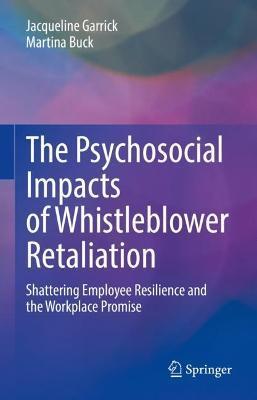The Psychosocial Impacts of Whistleblower Retaliation: Shattering Employee Resilience and the Workplace Promise

The Psychosocial Impacts of Whistleblower Retaliation: Shattering Employee Resilience and the Workplace Promise
This book analyzes the harms related to whistleblower retaliation, its psychosocial impacts on employees, and the institutional dysfunction it creates and perpetuates. Stigma and biases against whistleblowers interfere with their ability to make protected disclosures when harm to others is at stake. Retaliatory toxic tactics create an atmosphere and corporate culture that embodies fear and encourages bystander behavior.
In this book, the authors explore psychosocial impacts across domains that include financial, legal, social, physical, and emotional well-being. Ten of the 14 chapters specifically examine the toxic tactics of retaliation: gaslighting, mobbing, marginalizing, shunning, devaluing, double-binding, career blocking, counter-accusing, bullying, and doxxing. These toxic tactics are the building blocks of workplace traumatic stress (WTS) and can lead to posttraumatic stress disorder (PTSD), depression, substance abuse, and suicide. WTS is a term that differentiates between workplace violence or job stress, which can be components of WTS but do not fully describe the systemic hostile work environment that targets an employee. Understanding WTS and how it disrupts identity, causes moral injury, and shatters world views are important aspects for clinicians treating clients who are victims of this kind of hostile work environment.
The Psychosocial Impacts of Whistleblower Retaliation is a useful resource offering a new way for social workers, mental health providers, advocates, and other support services professionals and practitioners to assist whistleblowers. It helps clinicians understand how to view patients suffering from whistleblower retaliation and gives them a lexicon for forensic evaluations. Lawyers, especially those specializing in employment, labor, and Qui Tam cases, also could benefit from having a means to describe the psychosocial impacts of retaliation and WTS on their clients when filing for compensatory damages for pain and suffering during judicial proceedings. Finally, the book could appeal to employees and managers, human resources professionals, victim rights advocates, elected officials, media personnel, and other professionals who are interested in learning more about whistleblower retaliation and its psychosocial and cultural implications.
PRP: 929.91 Lei
Acesta este Pretul Recomandat de Producator. Pretul de vanzare al produsului este afisat mai jos.
836.92Lei
836.92Lei
929.91 LeiLivrare in 2-4 saptamani
Descrierea produsului
This book analyzes the harms related to whistleblower retaliation, its psychosocial impacts on employees, and the institutional dysfunction it creates and perpetuates. Stigma and biases against whistleblowers interfere with their ability to make protected disclosures when harm to others is at stake. Retaliatory toxic tactics create an atmosphere and corporate culture that embodies fear and encourages bystander behavior.
In this book, the authors explore psychosocial impacts across domains that include financial, legal, social, physical, and emotional well-being. Ten of the 14 chapters specifically examine the toxic tactics of retaliation: gaslighting, mobbing, marginalizing, shunning, devaluing, double-binding, career blocking, counter-accusing, bullying, and doxxing. These toxic tactics are the building blocks of workplace traumatic stress (WTS) and can lead to posttraumatic stress disorder (PTSD), depression, substance abuse, and suicide. WTS is a term that differentiates between workplace violence or job stress, which can be components of WTS but do not fully describe the systemic hostile work environment that targets an employee. Understanding WTS and how it disrupts identity, causes moral injury, and shatters world views are important aspects for clinicians treating clients who are victims of this kind of hostile work environment.
The Psychosocial Impacts of Whistleblower Retaliation is a useful resource offering a new way for social workers, mental health providers, advocates, and other support services professionals and practitioners to assist whistleblowers. It helps clinicians understand how to view patients suffering from whistleblower retaliation and gives them a lexicon for forensic evaluations. Lawyers, especially those specializing in employment, labor, and Qui Tam cases, also could benefit from having a means to describe the psychosocial impacts of retaliation and WTS on their clients when filing for compensatory damages for pain and suffering during judicial proceedings. Finally, the book could appeal to employees and managers, human resources professionals, victim rights advocates, elected officials, media personnel, and other professionals who are interested in learning more about whistleblower retaliation and its psychosocial and cultural implications.
Detaliile produsului









